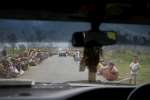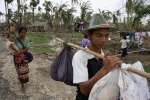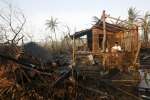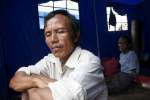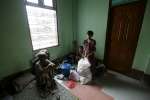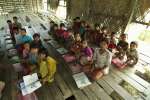UNHCR cash makes it easier for refugees to help themselves in Malaysia
News Stories, 26 March 2010
KUALA LUMPUR, Malaysia, March 26 (UNHCR) – It is early on a Sunday morning and Timothy, a refugee from Myanmar, is making his rounds of shophouses in the heart of Kuala Lumpur. Some 150 refugees live here, all ethnic Chin from Myanma and renting 25 rooms under the Senthang Housing Project which Timothy coordinates.
The mood is serene, the individual flats small but clean – a marked contrast to the dirty, noisy, cramped places many refugees in Malaysia are forced to rent because they have so little money.
Just ask Li Li, who used to live with her husband, and two boys, aged seven and 10, in a small three-bedroom flat with about 45 other people. "I could not get a lot of rest," she recalls. "Sometimes we had to sleep like this – with a person's head at a person's feet. When someone woke up to go to the bathroom, I also woke up."
That's why Li Li is so grateful for her new accommodations. "Senthang is better for my family," she says. "I like it because it is very quiet here and very peaceful. No one is allowed to drink alcohol and make trouble. There are no bad men here, all Myanmar people and we know who they are. So I feel very safe for my children. I feel very peaceful."
Timothy, a member of the Senthang Refugee Center whose brainchild the project was, is careful to cultivate the sanctuary feeling – the entrance is locked and visitors are limited at night.
The Senthang Housing Project opened in November, 2009 with funds from the UN refugee agency's new small grants project, the Social Protection Fund, which provides up to US$3,500.00 for individual small-scale self-help projects developed and implemented by refugee groups. Since its launch in August 2009, the Fund has approved grants for 42 proposals from refugee groups.
"We wanted to provide our people a safe place to live, where they would not be exploited by the landlord," says Timothy. "In many circumstances, refugees are forced to pay several months' rent up front, which they cannot afford. With the funding we received from UNHCR, we were able to pay the deposit for 25 rooms which the refugees then rent directly from us on a monthly basis."
There are some 82,400 registered refugees and asylum-seekers in Malaysia, mostly from Myanmar, living in cities and towns. While they receive assistance and support from UNHCR and non-governmental organizations (NGOs), many refugees have to find their own ways of surviving in cities. This is why UNHCR set up the Social Protection Fund to support the refugee communities' own solutions.
"Within the refugee communities, there is a wealth of knowledge and skills for project implementation," says Letchimi Doraisamy, the UNHCR officer in charge of the Social Protection Fund. "They best know the needs of their communities for their day-to-day survival."
"Most importantly, they have already been running initiatives that support the needs of their communities even without UNHCR's financial support. By providing grants to refugee groups, UNHCR ensures projects can be implemented and sustained effectively."
The Segambut Myanmar Refugee Community applied for the grant to add on a much-needed service in their existing refugee hostel project – a grocery store for the 250 refugees living in the area.
"We realized that it was difficult for our refugee community to travel to the market due to security fears," says project coordinator Dun, a refugee from Myanmar. "Some have been robbed while carrying money for groceries. A grocery store at this centre would mean refugees can easily obtain daily food items and not worry about security."
So Shining Valley Grocery Store was set up in the living room of the refugee hostel. Dun buys sundry items wholesale and can sell them at lower prices than the neighbourhood shops. Dun says the benefits of the UNHCR funding are more than just a convenient grocery store.
"Half the profit is used to pay for the salary of the shopkeepers while the remaining amount goes back to our community project. We use the money to help with medical emergencies such as delivery of babies, hospitalization costs and other emergency costs," Dun says.
Back at the apartment building, Timothy agrees the pay-offs have been far-reaching and unexpected.
"The profit from the project is now being used for a school for the Chin children living in the neighbourhood, so this is good for our children," he says. "But I think there are more benefits. The tenants of each floor act like a 'village' that shares the cooking and cleaning, and they take care of each other. This becomes a home for them."
By Yante Ismail in Kuala Lumpur, Malaysia





